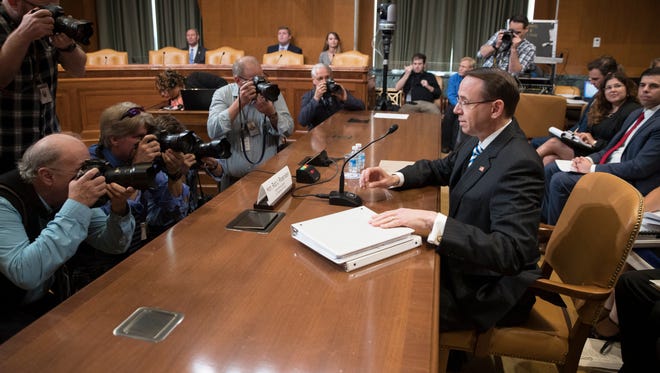Deputy Attorney General Rod Rosenstein says there's no cause to fire Mueller
WASHINGTON — Deputy Attorney General Rod Rosenstein affirmed his support for Russia special counsel Robert Mueller on Tuesday, despite recent suggestions that President Trump was weighing Mueller's dismissal.

Rosenstein, who appointed Mueller last month to lead the Justice Department's wide-ranging inquiry into possible collusion between the Trump campaign and Russian officials and has the authority to remove him, told a Senate Appropriations subcommittee that he saw no cause for Mueller's dismissal.
"Director Mueller is going to have the full independence he needs to conduct that investigation," Rosenstein said.
Rosenstein also said Trump has not raised the issue of the special counsel with him, nor has the president discussed Mueller's tenure with him.
“I am not going to follow any order unless it is a lawful order," Rosenstein said, adding that it “would not matter what anybody said. ... There is no secret plan (to remove Mueller) that involves me."
“I appointed him; I stand by that decision,’’ he said. “I will defend the integrity of that investigation."
White House spokesperson Sarah Sanders said Trump has no plans to seek Mueller's removal.
"While the president has the right to, he has no intention to do so," she told reporters aboard Air Force One as Trump returned from a trip to Wisconsin.
The deputy attorney general's testimony comes after Trump friend and Newsmax CEO Chris Ruddy said Monday that Trump was considering "terminating" Mueller.
"I think he's weighing that option," Ruddy said in an interview with PBS NewsHour.
The authority to appoint a special counsel fell to Rosenstein after Attorney General Jeff Sessions recused himself from the Russia case because of his failure to disclose during his January confirmation hearing that he had met before the election with Russian ambassador Sergey Kislyak.
Sessions, who had been slated to testify before the Senate Appropriations panel, appeared later Tuesday before the Senate Intelligence Committee investigating Russian interference in the 2016 elections. The attorney general was questioned about his contacts with Kislyak and his role in last month's firing of FBI director James Comey.
Asked whether Sessions' involvement in Comey's dismissal violated the attorney general's recusal from matters related to Russia, Rosenstein declined to comment but indicated that Mueller "ought to review that" question.
Still, top Democrats on the Senate Appropriations subcommittee fumed that Sessions had abruptly canceled his appearance at the hearing, with Sen. Patrick Leahy, D-Vt., suggesting that the attorney general was "cowering" in the face of tough questioning.
"I won't mince words," Leahy told Rosenstein on Tuesday. "You are not the witness we were supposed to hear from today. That witness is the attorney general of the United States.''
New Hampshire Sen. Jeanne Shaheen, the subcommittee's top Democrat, said she also was "troubled'' by Sessions' cancellation.
"The attorney general is still responsible for answering critical questions from this committee,'' Shaheen said.
At a press conference Tuesday, House Speaker Paul Ryan, R-Wis., said he knew Mueller and trusted him.
“I think the best case for the president is to be vindicated by allowing this investigation to go on thoroughly and independently. So I think the best advice would be to let Robert Mueller do his job,” Ryan said.
Senate Minority Leader Chuck Schumer, D-N.Y., said Tuesday that he is "frankly disturbed by the new strategy on the hard right to discredit Special Counsel Mueller and sully his reputation."
"Their strategy is clear: they know or suspect the facts might not be good for the President, so they’re trying to vilify the man who’s in charge of finding them," Schumer said in a speech on the Senate floor.
The White House should let Mueller do his job if it has nothing to hide, Schumer said.
"When people say when there’s smoke there’s fire, they’re pointing to actions like this, and it makes the American people distrustful of the White House and their allies," Schumer said. "I know that all of this probably doesn’t bother former Director Mueller. He’s got a very strong spine. He will go after the facts regardless of the noise around him. But they’re bothersome, they’re wrong, they’re nasty."
In appointing Mueller last month, Rosenstein said that the "public interest requires me to place this investigation under the authority of a person who exercises a degree of independence from the normal chain of command."
Mueller served as FBI director from 2001 to 2013 under both the George W. Bush and Obama administrations. He preceded Comey as FBI director and was the longest-serving director since J. Edgar Hoover. He served two additional years beyond his 10-year term, to ensure stability during a transition period in President Obama's national security team.
In his special counsel role, Mueller has assumed all the powers of a federal prosecutor — including subpoena authority.
Contributing: Eliza Collins